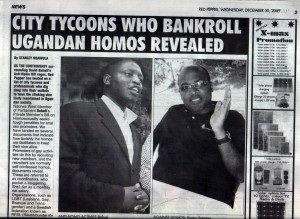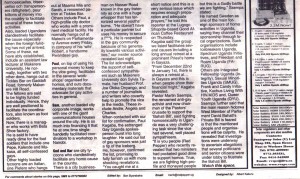In the recent letter from the Ugandan National Pastors Task Force Against Homosexuality to Rick Warren, the Task Force disclosed that the Uganda Joint Christian Council agreed to support the Anti-Homosexuality Bill with the following amendments:
a. We suggested reduction of the sentence to 20 years instead of the death penalty for the offense of aggravated homosexuality.
b. We suggested the inclusion of regulations in the law to govern provision of counseling and rehabilitation to persons experiencing homosexual temptations. The churches are willing to provide the necessary help for those seeking counseling and rehabilitation.
c. Even with the provision for counseling and rehabilitation in the law, homosexuality should remain a punishable offense to control its spread.
These amendments sound very much like the suggestions of Scott Lively who spoke to the Ugandan Parliament in March of this year. According to a post on his website, Lively suggested these points at that time.
My trip was quite successful, encompassing multiple seminars, sermons, media appearances and private meetings with key leaders, all packed into a single week. My hosts were very pleased. But the high point of the week was my address to members of the Ugandan Parliament in their National Assembly Hall. In it I urged the government to shift the emphasis of its criminal law against homosexuality from punishment to rehabilitation by providing the option of therapy, similar to the option I once chose after being arrested for drunken driving many years ago (in my wild pre-Christian days). Such a change would represent a considerable liberalization of its policies (currently a holdover from Colonial British common law, similar to US policy until the 1950s), while preserving sufficient legal deterrent to prevent the international “gay” juggernaut from homosexualizing the society as it has done in Europe and other countries. I thought it was an inspired compromise.
Lively’s “inspired compromise” seems to have inspired the Ugandan pastors’ coalition. Lively elaborated a bit in a recent posting:
In my view, homosexuality (indeed all sex outside of marriage) should be actively discouraged by society — but only as aggressively as necessary to prevent the mainstreaming of alternative sexual lifestyles, and with concern for the preservation of the liberties of those who desire to keep their personal lifestyles private.
The suggested changes in the Anti-Homosexuality Bill could follow Lively’s suggestions although it is not clear how the regulations would be written. Would counseling be available for those who present themselves as having temptation as framed by the pastors’ coalition or would counseling be available to those who offend the law in some way as an option to jail? Or will Bahati re-write the bill to include both options?
Ethics and Integrity Minister Nsaba Buturo may have signaled the direction he favors with recent comments to Ugandan television, saying:
“…we are saying, that look… instead of killing somebody, provide mechanisms for counseling, and other supports, so that the person may actually be rehabilitated. And I see logic in that one, because already we have some former homosexuals who are being rehabilitated.”
Given how closely the pastors and the legislators seem to be there, the changes may appear in the second draft of the bill. The “kill the gays” bill may turn into the “cure the gays” bill by February, 2010.
Because the changes may appear soon, I want to engage the discussion on the topic of reorientation therapy in an environment where the other option is jail or worse. Almost immediately after there were rumblings of the bill being changed to included coerced therapy, Alan Chambers, President of Exodus International came out in opposition to the proposal. On the Facebook group dedicated to opposing the bill, Chambers said:
I am NOT for forced therapy for gay and lesbian people. While no one chooses their attractions I do believe that it is everyone’s God given right to choose what you do with those attractions (consenting adults). I believe that those who are conflicted by their faith and feelings have the right to choose therapy and those who aren’t conflicted shouldn’t be forced into anything.
I also asked the National Association for the Research and Therapy of Homosexuality to give their opinion of the proposed therapy option. Past-president A. Dean Byrd responded in an email:
Dear Dr. Throckmorton,
As you are aware, NARTH’s Governing Board has accepted the Leona Tyler Principle which states that NARTH, as a scientific organization, takes no position on any scientific issue without the requisite science or professional experience. NARTH members, as individuals, are free to speak on any issue.
NARTH values the inherent worth of all individuals and respects individual right of autonomy and self determination.
NARTH’s position on homosexuality was clearly articulated by Dr. Julie Harren Hamiliton in a recent edition of the APA Monitor: homosexuality is not invariably fixed in all people – some people can and do change. And psychological care should be available to those who seek such care.
NARTH encourages its members to abide the Code of Ethics of their respective organizations and such codes proscribe the coercive efforts. It goes without saying that NARTH would support the humane treatment of ALL individuals.
We are aware of the situation in Uganda but thank you for bringing this to our attention. I am sure that you are aware that as a scientific organization, NARTH does not take political positions; however, we are happy to provide a summary of what science can and cannot say about homosexuality for those who do.
Dr. Throckmorton, if history is a good indicator, you will likely not be happy with this response. However, I hope such responses will help you understand NARTH’s mission as a scientific organization.
With warm regards,
A. Dean Byrd, PhD, MBA, MPH
Leaving aside the comments about NARTH not taking political positions, I want to point out the money quote:
NARTH encourages its members to abide the Code of Ethics of their respective organizations and such codes proscribe the coercive efforts.
Byrd’s answer did oppose coercion (although undefined), but did not comment on the efficacy of such measures. Given that Byrd’s answer was not clear, I wrote back to ask for clarification. David Pruden, NARTH administrative director answered saying:
Research tells us that forced therapy is almost always a failure. It is unethical and unworkable.
Normally, I do not look to Exodus or NARTH for research state-of-the-art on sexual orientation, but there are two important reasons to ask their position on this question. One, since the proposal may call for some kind of treatment or ministry, it seems reasonable to poll the views of the two most prominent groups who currently provide those efforts. The second reason is because the guy who recommended the option in the first place, Scott Lively, highly recommends Exodus and NARTH.
Here is a 2007 video of Scott Lively in Latvia recommending Exodus and NARTH. Note how crucial it is to Lively to convince the nation of a gay cure.
And then in Uganda, he continued his praise of NARTH by saying their website was an important source of information, second only to his.
Here is what Scott Lively could not have told his Ugandan audience but can now be told. One, both Exodus and NARTH have removed any reference to Scott Lively’s work from their websites (click the links to read about these actions). Two, NARTH and Exodus (at least informally through Alan Chambers) consider coercive therapy to be unethical and ineffective.
Let me speak directly to the Ugandan supporters of the bill. The man, Scott Lively, you brought to speak in Parliament to recommend a rehabilitation option has been removed from the websites of the organizations he recommended to you. Furthermore, the organizations which Scott Lively encouraged you to trust says coercive therapy is not ethical or effective. I know he has said that such measures were once used effectively but this is not the case.
I need to add that I do not agree with NARTH about very much and certainly think that they are wrong in the way they discuss sexual orientation as a fluid trait. However, even this group, who exists to promote the idea that some people can change, rejects the idea that a coercive environment is appropriate. While they dramatically underestimate the role of social stigma as an aspect of why people seek their services here in the US, at least they see clearly that forced therapy of the kind contemplated by Lively and UJCC are in David Pruden’s words, “unethical and unworkable.”

